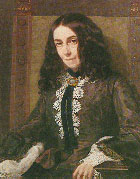A Curse For A Nation Comments
I heard an angel speak last night,
And he said 'Write!
Write a Nation's curse for me,
And send it over the Western Sea.'
...
Read full text
THREE: The central message calls for accountability, urging individuals to confront injustice and uphold moral integrity. Browning's powerful words resonate with timeless relevance, reminding readers of the importance of actively opposing injustice and striving for positive change in society
TWO: As a strong abolitionist, Browning expresses her outrage at the law and its implications for the nation. Through varied stanza structures and rhyming schemes, she highlights the hypocrisy, apathy, and complicity of a nation in perpetuating oppression and wrongdoing.
ONE: It is a poignant critique of societal injustices and moral decay. The poem responds to the Fugitive Slave Act of 1850, which required citizens to return escaped slaves to their owners, even in states where slavery was illegal.
This very lengthy poem is The Classic Poem Of The Day, an amazing fantastic poem chosen by Poem Hunter and Team. Full Stars for the worldfamous EBB
This poem makes sense many years after her death. The roots of flowers cut!
Honestly I really love this poem. Its very fasanating and interesting.
............writing a curse upon a nation is not a very nice thing to do Elizabeth....
maybe - but enslaving an entire people, actually harming them, not just provoking them with a curse, might be actually so much worse
Yeah, I hate the amount of children jews enslaved. Time to sing a curse that lasts.
Ye shall watch while strong men draw the nets of feudal law to strangle the weak A happening of centuries- the curse that keeps on falling upon most prosperous! Wonderful poem!
This is fine and absolute. Elizabeth, this poem has inspired me.
you can see this poem still taking part in today's american society. not with slavery but with our gov't still. i wonder if she wrote this poem in a night. for how could such intellect be gathered plainly and with flawless structure unless it took many days to write or unless there was a God at hand.
This poem was against american slavery. it was published in an abolitionist newspaper and then again in Poems Before Congress. I think she uses the 'curse' because of the old testament prophets who spoke up against Israel and also against foreign nations. she may mean to show the lack of Christian behavior our supposedly Christian nation (at the time) was showing in keeping slaves. anyway, the poem's interesting. I like the prologue particularly. just beautiful.
An anti - slavery poem it would appear, with political undertones.
i believe this is address to slavery in america...but why she picks this his dad once owns slaves in jamaica. it might be at that time you must protest on something. it might be fad at that time. now i could imagine why women movements pick her as role model.
Beggars and cry of women are great curse of a nation indeed! Nothing is perfect in any nation! Praises cannot last longer! Curses cannot be curtailed!
This poem is addressed to the state of mind of the world which opposes justice for all, freedom from all kinds of oppression, and that foments the the idea that progress is being made by walking in the blood of the helpless. EB has written more melodious poems, but none with more social impact. The questions was asked as to whether this poem swayed any of the slaveholders, and others of their ilk. One will never know for sure, but the slaves are free from chains today, and in some tomorrow will be free from the foot on the neck. As long as concentrations of power exist that exceed the power of the government, such as the huge industries that we all know exceed the power of and and all national governments, this poem will still be current and spot-on. One might go back and re-read the part of the poem where the idiots shout at the walls (sic) , and make them own assessment of whom those idiots consist today. Great Poem, great poet, and fully equal to her great husband. James

FOUR: The themes explored include disappointment, failure, identity, immortality, journey, and relationships. The poem evokes emotions such as empathy, gratitude, grief, kindness, and sadness, emphasizing the urgency of addressing societal issues.